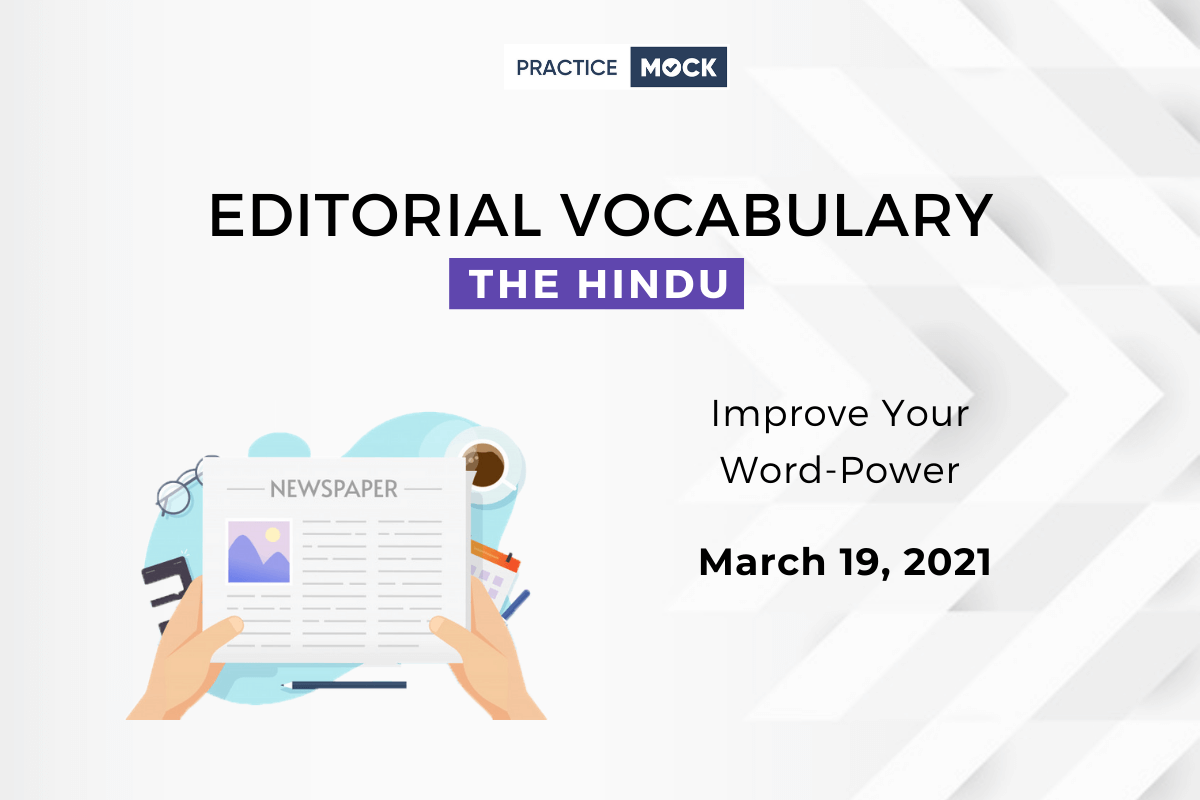Read today’s Hindu editorial which talks about “AADHAAR AS A HURDLE: ON AUTHENTICATION FAILURES AND WELFARE DELIVERY”. These daily Hindu editorial articles will give you a set of new words daily to learn along with their contextual meanings.
Difficult Words & their Meanings
| Difficult Word/Phrase | Contextual Meaning |
| allegation | a statement, made without giving proof |
| petitioner | a person who is asking for action from a law court |
| biometric | using detailed information about someone’s body, for example the patterns of colour in their eyes, in order to prove who they are |
| authentication | the process of proving that something is real or true |
| legitimate | allowed by law |
| exemption | special permission not to do or pay something |
| susceptible | easily influenced |
| denied | to not allow something |
| decentralised | organizations or their activities which are not controlled from one central place |
| disbursal | to officially pay to someone |
Aadhaar as a hurdle: On authentication failures and welfare delivery
Inefficiencies in the Aadhaar project should not come in the way of welfare delivery
The Supreme Court, on Wednesday, did the right thing by terming as serious the allegation (a statement, made without giving proof) by a petitioner (a person who is asking for action from a law court) that three crore ration cards were cancelled for not being linked with the Aadhaar database and that these were connected to reported starvation deaths in some States. The unique identification scheme has been in existence for more than a decade and recent data has estimated that nearly 90% of India’s projected population has been assigned the Aadhaar number. Following the Court’s judgment in 2018, upholding the Aadhaar programme as a reasonable restriction on individual privacy to fulfil welfare requirements and dignity — a 4-1 majority Bench had also rejected a review petition in January 2021 — questions about the scheme’s validity for public purposes have been put to rest. But that has not meant that concerns about the failures in the use of the identity verification project have been allayed. These include inefficiencies in biometric (using detailed information about someone’s body, for example the patterns of colour in their eyes, in order to prove who they are) authentication (the process of proving that something is real or true) and updating, linking of Aadhaar with bank accounts, and the use of the Aadhaar payment bridge. With benefits under the PDS, the NREGA and LPG subsidy, among other essentials, requiring individuals to have the Aadhaar number, inefficiencies and failures have led to inconvenience and suffering for the poor. There are reports that show failures in authentication having led to delays in the disbursal of benefits and, in many cases, in their denial due to cancellation of legitimate (allowed by law) beneficiary names. The government had promised that exemption (special permission not to do or pay something) mechanisms that would allow for overriding such failures will help beneficiaries still avail subsidies and benefits despite system failures. That has been the response by the government to the recent petition as well, but reports from States such as Jharkhand from 2017, for example, suggest that there have been starvation deaths because of the denial of benefits and subsidies.
Biometric authentication failures are but expected of a large scale and technology-intensive project such as the UID. Despite being designed to store finger and iris scans of most users, doubts about the success rates of authentication and the generation of “false negatives” have always persisted, more so for labourers and tribal people. Those engaged in manual and hard labour, for example, are susceptible (easily influenced) to fingerprint changes over time. In practice, beneficiaries have tended to use Aadhaar cards as identity markers but there have been instances of people losing cards and being denied (to not allow something) benefits. Given the scale of the problem, the central and State governments would do well to allow alternative identification so that genuine beneficiaries are not denied due subsidies. The question of fraud can still be addressed by the use of other verification cards and by decentralised (organizations or their activities which are not controlled from one central place) disbursal (to officially pay to someone) of services at the panchayat level.
RBI Grade B Phase 2 Mock Tests
- Sign Up on Practicemock for Updated Current Affairs, Free Topic Tests and Free Mini Mocks
- Sign Up Here to Download Free Study Material
Free Mock Tests for the Upcoming Exams
- IBPS PO Free Mock Test
- RBI Grade B Free Mock Test
- IBPS SO Free Mock Test
- NABARD Grade A Free Mock Test
- SSC CGL Free Mock Test
- IBPS Clerk Free Mock Test
- IBPS RRB PO Free Mock Test
- IBPS RRB Clerk Free Mock Test
- RRB NTPC Free Mock Test
- SSC MTS Free Mock Test
- SSC Strenographer Free Mock Test
- GATE Mechanical Free Mock Test
- GATE Civil Free Mock Test
- RRB ALP Free Mock Test
- SSC CPO Free Mock Test
- AFCAT Free Mock Test
- SEBI Grade A Free Mock Test
- IFSCA Grade A Free Mock Test
- RRB JE Free Mock Test
- Free Banking Live Test
- Free SSC Live Test



